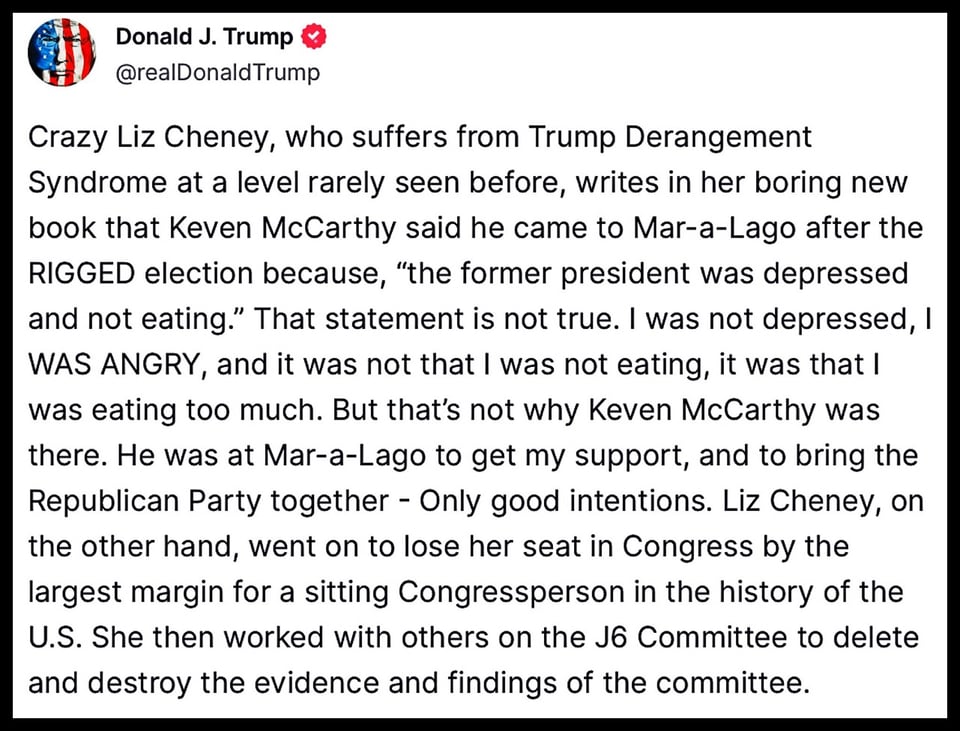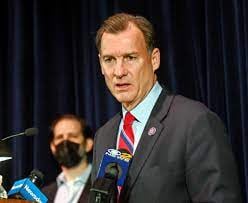Tuesday, December 5, 2023. Annette’s News Roundup.
I think the Roundup makes people feel not so alone.
To read an article excerpted in this Roundup, click on its blue title. Each “blue” article is hyperlinked so you can read the whole article.
Please feel free to share.
Invite at least one other person to subscribe today! https://buttondown.email/AnnettesNewsRoundup
______________________________
Antisemitism -“spreading like a cancer.”
Schumer spoke on the rise of antisemitism. 43 minutes. A critical speech. Watch.👇
Letters from an American. December 2, 2023.
On Wednesday, November 29, Senate majority leader Chuck Schumer (D-NY) delivered a landmark speech on American antisemitism, inspired by the fact that protests against Israel’s assault on Gaza after the October 7 attack by Hamas have descended into an embrace of Hamas’s stated goal of the complete destruction of Israel. From there it has, for some people, been a short step to attacking Jewish people in general.
“I feel compelled to speak because I am the highest-ranking Jewish elected official in America; in fact, the highest-ranking Jewish elected official ever in American history,” Schumer said. “And I have noticed a significant disparity between how Jewish people regard the rise of antisemitism, and how many of my non-Jewish friends regard it. To us, the Jewish people, the rise of antisemitism is a crisis—a five-alarm fire that must be extinguished. For so many other people of good will, it is merely a problem, a matter of concern. Today, I want to use my platform to explain why so many Jewish people see this problem as a crisis.”
Schumer anchored his speech in the long history of civil rights advocacy on the part of American Jews. In 1909, New York Jew Henry Moskowitz was a founding member of the National Association for the Advancement of Colored People (NAACP), and Jack Greenberg, whose family fled pogroms in Europe, served 23 years at the head of the NAACP Legal Defense Fund after its founder, famous Black jurist Thurgood Marshall, stepped down.
In 1958, in a speech to the American Jewish Congress, the Reverend Dr. Martin Luther King Jr. said, “My people were brought to America in chains. Your people were driven here to escape the chains fashioned for them in Europe. Our unity is born of our common struggle for centuries, not only to rid ourselves of bondage, but to make oppression of any people by others an impossibility.”
Five years later, the president of the American Jewish Congress, New Jersey rabbi Dr. Joachim Prinz, spoke before King at the March on Washington. “I speak to you as an American Jew,” he told the crowd. “As Americans we share the profound concern of millions of people about the shame and disgrace of inequality and injustice which make a mockery of the great American idea. As Jews we bring to this great demonstration, in which thousands of us proudly participate, a two-fold experience—one of the spirit and one of our history…. It…is not merely sympathy and compassion for the Black people of America that motivates us. It is above all and beyond all such sympathies and emotions a sense of complete identification and solidarity born of our own painful historic experience.”
It was that painful historic experience and an attempt to make oppression impossible that led Jewish activists to support the civil rights movement. In the Freedom Summer of 1964, half the civil rights workers who traveled to Mississippi were Jewish, including Andrew Goodman and Michael Schwerner, murdered alongside Black activist James Chaney outside of Philadelphia, Mississippi.
That history of Jewish support for civil rights is written across the landscape of our country: the main bridge dominating the Boston skyline is named for civil rights worker Leonard P. Zakim in memory of his work to “build bridges of understanding between different ethnic, racial, and religious groups,” as his wife said at the bridge’s dedication.
In his speech, Schumer tied into that history, saying that “bigotry against one group of Americans is bigotry against all” and noting that he had worked to protect Asian-Americans and Arab-Americans, as well as to protect houses of worship for all religions from extremists. He also noted, at some length, that it is possible both to abhor Hamas and to deplore the destruction that has rained down on the Palestinian people.
But Schumer expressed dismay that as hatred toward American Jews is rising dangerously—the Anti-Defamation League estimates that antisemitic incidents have increased nearly 300 percent since October 7—some Americans, people that Jews believed were “ideological fellow travelers,” are celebrating the October 7 attack as an assault on “colonizers.”
“Not long ago,” Schumer said, “many of us marched together for Black and Brown lives, we stood against anti-Asian hatred, we protested bigotry against the LGBTQ community, we fought for reproductive justice out of the recognition that injustice against one oppressed group is injustice against all. But apparently, in the eyes of some, that principle does not extend to the Jewish people.”
“Many, if not most, Jewish Americans, including myself, support a two-state solution,” he said, “We disagree with Prime Minister [Benjamin] Netanyahu and his administration’s encouragement of militant settlers in the West Bank, which has become a considerable obstacle to a two-state solution.” But “the most extreme rhetoric against Israel has emboldened antisemites who are attacking Jewish people simply because they are Jewish.”
These attacks, Schumer said, conjure up the history of millennia in which Jews were slaughtered. “[W]hen Jewish people hear chants like ‘From the river to the sea,’ a founding slogan of Hamas, a terrorist group that is not shy about their goal to eradicate the Jewish people, in Israel and around the globe, we are alarmed.”
“More than anything, we are worried—quite naturally, given the twists and turns of history—about where these actions and sentiments could eventually lead. Now, this is no intellectual exercise for us. For many Jewish people, it feels like a matter of survival, informed once again by history.”
“Can you understand why Jewish people feel isolated when we hear some praise Hamas and chant its vicious slogan?” Schumer asked. “Can you blame us for feeling vulnerable only 80 years after Hitler wiped out half of the Jewish population across the world while many countries turned their back? Can you appreciate the deep fear we have about what Hamas might do if left to their own devices? Because the long arc of Jewish history teaches us a lesson that is hard to forget: ultimately, that we are alone.”
Schumer begged the American people “of all creeds and backgrounds” to defend the “pluralistic, multiethnic democracy” that has enabled Jewish people in the United States “to flourish alongside so many other immigrant groups.”
He asked them to “learn the history of the Jewish people, who have been abandoned repeatedly by their fellow countrymen—left isolated and alone to combat antisemitism—with disastrous results,” and to “reject the illogical and antisemitic double standard that is once again being applied to the plight of Jewish victims and hostages, to some of the actions of the Israeli government, and even to the very existence of a Jewish state.”
Schumer asked all Americans “to understand why Jewish people defend Israel.” They do not “wish harm on Palestinians,” he said, but instead “fear a world where Israel is forced to tolerate the existence of groups like Hamas that want to wipe out all Jewish people from the planet. We fear a world where Israel, the place of refuge for Jewish people, will no longer exist. If there is no Israel,” he said, “there will be no place, no place for the Jewish people to go when they are persecuted in other countries.”
In view of history and of rising antisemitism, Jewish Americans are afraid of what the future might bring, Schumer said. “And perhaps worst of all,” he said, “many Jewish Americans feel alone to face all of this, abandoned by too many of our friends and allies in our greatest time of need.”
He implored “every person and every community and every institution to stand with Jewish Americans and denounce antisemitism in all of its forms.”
“We are stewards of the flames of liberty, tolerance, and equality that warm our American melting pot, and make it possible for Jewish Americans to prosper alongside Palestinian Americans, and every other immigrant group from all over the world,” he concluded.
“Are we a nation that can defy the regular course of human history, where the Jewish people have been ostracized, expelled, and massacred over and over again?” he asked. Then he answered his own question: “Yes. And I will do everything in my power—as Senate Majority Leader, as a Jewish American, as a citizen of a free society, as a human being—to make it happen.”
“Ken Y-hi Ratzon,” he concluded. “May it be his will.” (Heather Cox Richardson).
This 👇 happened in Philadelphia over the weekend.
Protestors in Philadelphia stand outside of a Jewish & Israeli owned falafel restaurant
— Jordan (@thatJVG) December 3, 2023
“Goldie, Goldie you can’t hide, we charge you with genocide” pic.twitter.com/yF7hQwev66


I’ve communicated tonight with @Mike_Solomonov and his team at Goldie to share our support and Lori and I look forward to breaking bread there with them again soon.
— Governor Josh Shapiro (@GovernorShapiro) December 4, 2023
White House Condemns Protest at Israeli Restaurant in Philadelphia.

Customers lined up for lunch at the Goldie falafel restaurant in Philadelphia on Monday afternoon.
White House and state officials said that a protest on Sunday was hateful and antisemitic after dozens of pro-Palestinian demonstrators opposed to Israel’s offensive in the Gaza Strip chanted slogans charging “genocide” outside an Israeli-style falafel shop in Philadelphia.
The White House issued a statement on Monday that called the protest targeting the establishment “unjustifiable,” adding to reaction from Pennsylvania officials.
A video clip posted on X showed the pro-Palestinian protesters outside Goldie, a vegan falafel shop owned by Michael Solomonov, an Israeli-born chef, and Steve Cook, a former investment banker turned restaurateur, through their Philadelphia hospitality group, CookNSolo Restaurants.
“Goldie, Goldie, you can’t hide. We charge you with genocide,” the group chanted in the video taken on Sunday.
The White House joined Gov. Josh Shapiro of Pennsylvania in condemning the focus of protesters on the restaurant.
“It is antisemitic and completely unjustifiable to target restaurants that serve Israeli food over disagreements with Israeli policy,” Andrew Bates, a White House spokesman, said in the statement on Monday.
“This behavior reveals the kind of cruel and senseless double standard that is a calling card of antisemitism,” Mr. Bates said.
He added that President Biden “will always stand up firmly against these kinds of undignified actions.”
Social media postings from accounts going by The Philly Palestine Coalition and The Philadelphia Free Palestine Coalition called on people to “flood Philly for Gaza” on Sunday, but did not name the restaurant. Their invitation also called for a lift to “the siege on Gaza” and to “end military aid to Israel.” It was unclear from their social media posts whether those organizations intended to protest at Goldie or how long that demonstration lasted, and messages sent to the groups’ social media accounts had not been answered on Monday.
Through a spokeswoman, Mr. Solomonov, who is Jewish and was born near Tel Aviv, declined to comment on Monday.
A prominent, award-winning chef, Mr. Solomonov has several restaurants serving Israeli food in Philadelphia, including Zahav, which opened in 2008. A group called the Philly Palestine Coalition has called for a boycott of many of his restaurants.
Following the start of the Israel-Hamas war, Mr. Solomonov announced he would donate proceeds from sales on Oct. 12 to Friends of United Hatzalah, a nonprofit emergency medical service in Israel.
The protest on Sunday came amid mounting violence as Israel vowed to root out Hamas, the Palestinian group that controls the Gaza Strip and launched a surprise attack against Israel on Oct. 7, killing about 1,200 people. That attack prompted intense retaliation that has killed more than 15,000 people in Gaza, according to officials in Gaza.
There have been street demonstrations in Philadelphia, New York and other cities and towns around the United States by pro-Israel and pro-Palestinian protesters.
Jewish advocacy groups such as the Anti-Defamation League have reported a rise in antisemitic threats and incidents in the United States. The group said in October that it had recorded 312 antisemitic episodes between Oct. 7 and Oct. 23, with 190 of those directly linked to the Israel-Hamas War.
On Sunday and Monday, state leaders in Pennsylvania took to social media to criticize the protest outside Goldie.
Governor Shapiro shared a clip of the protest on X and described it as “a blatant act of antisemitism — not a peaceful protest.”
He added that the restaurant “was targeted and mobbed because its owner is Jewish and Israeli.”
“This hate and bigotry is reminiscent of a dark time in history,” he said.
Senator John Fetterman, Democrat of Pennsylvania, said on X that demonstrators could instead protest “Hamas’ systematic rape of Israeli women and girls” or demand that “the remaining hostages be immediately released.”
Representative Brendan Boyle, a Democrat whose district includes Philadelphia, said on X that “Philadelphia stands against this sort of harassment and hate.”
Mayor Jim Kenney of Philadelphia said on Monday that the Philadelphia Commission on Human Relations would look into the protest. (New York Times).
Axios PM. White House spokesperson Andrew Bates today called it "antisemitic and completely unjustifiable to target restaurants that serve Israeli food over disagreements with Israeli policy."
"President Biden has fought against the evil of antisemitism his entire life, including by launching the first national strategy to counter this hate in American history," the statement adds. "He will always stand up firmly against these kinds of undignified actions."
What we're hearing: The 2020 Biden-Harris headquarters was just a few blocks from Goldie, which was a lunch mainstay for campaign staffers.
Minority Leader McConnell called Schumer’s speech “Extraordinary” and said “I stand with him.” 1 minute.
One more thing.
Looking for Chanukah/Christmas/Birthday gifts? Try this cookbook by Michael Solomonov.
Solomonov owns Philadelphia's Federal Donuts, Dizengoff, Abe Fisher, Goldie, K'Far, Merkaz and Laser Wolf, and Brooklyn’s Laser Wolf.
Solomonov, James Beard Award winner of Outstanding Restaurant (2019), is also an outspoken peace advocate.
He was also James Beard Award winner of Outstanding Chef (2017) and James Beard Book of the Year and Best International Cookbook (2016).
In 2021, The New York Times named his Brooklyn restaurant Laser Wolf as one of "the 50 places in America we're most excited about right now.”
Goldie was the target of antisemites (posted above) in Philadelphia over the weekend.
Zahav cookbook - Michael Solomonov.
https://www.amazon.com/s?k=zahav+cookbook+-+michael+solomonov&crid=3QYXZNIXENLAJ&sprefix=Zahav%2Caps%2C91&ref=nb_sb_ss_ts-doa-p_1_5(This link 👆 may pay a commission. Any commission will go to charity).
______________________________
Liz Cheney speaks up.
The Vice Chair of the January 6th Committee’s new book, Oath and Honor, A Memoir and a Warning comes out Today. She spoke with John Dickerson on CBS Sunday Morning this past weekend. 9 minutes.
Excerpts from the Cheney interview.
Former Republican Wyoming Congresswoman Liz Cheney says that if Donald Trump is elected it will mean the end of the republic. She said a vote for Trump 'the last election that you ever get to vote in.’
Cheney has kept up her warning that the U.S. would be “sleepwalking into dictatorship” if Trump is elected.
“If you look at what Donald Trump is trying to do, he can’t do it by himself. He has to have collaborators. And the story of Mike Johnson is a story of a collaborator.” (Cheney wrote this in her book as well and before Johnson, who was a complete unknown, was elected House Speaker.).
Cheney suggested a Republican congressional majority that would be subservient to another Trump White House presented a tangible “threat” to American democracy. “I do think it presents a threat if the Republicans are in the majority in January 2025.”
She predicted Trump wouldn't leave office if reelected.
She wouldn't rule out casting a ballot for Biden.

______________________________
George Santos has been expelled from Congress. Here's how his replacement will be chosen - ABC News

George Santos has been expelled from Congress. Here's how his replacement will be chosen - ABC News
Now that George Santos has been expelled, New York Gov. Kathy Hochul will have to call a special election and the party leaders will pick nominees to replace him.
Questions are already swirling about who will replace [George Santos]…. The answer depends on who wins a special election for his swing seat.
New York Gov. Kathy Hochul, a Democrat, will have to call the special election within 10 days of Santos' expulsion, according to state law.
"I am prepared to undertake the solemn responsibility of filling the vacancy in New York's 3rd District," Hochul said just after Santos was removed. "The people of Long Island deserve nothing less."
That election will occur within 70 to 80 days of Hochul calling it, and she will not be able to appoint someone to the seat before then. The vacancy weakens Republicans' already narrow majority in the House.
There will be no traditional party primary where Democratic and Republican voters will choose from a list of candidates seeking to succeed Santos.
Instead, county leaders from each party will internally vote for and nominate candidates for the special election, according to New York election law. That will likely kick off a competitive courtship of local Republicans by many within Santos' own party.
Nassau County Democratic Chair Jay Jacobs previously told ABC News that a handful of candidates were being considered for their pick -- including former Rep. Tom Suozzi, 2022 Democratic nominee Robert Zimmerman and former state Sen. Anna Kaplan, among some others.

Tom Suozzi.

Anna Kaplan.
Suozzi and Kaplan have already launched 2024 primary election challenges for Santos's seat.
Since the district is mostly in New York's Nassau County but also includes parts of Queens, the consideration of nominees will be jointly made by Nassau and Queens Democrats, with Rep. Gregory Meeks leading the Queens cohort, in consultation with the Democratic Congressional Campaign Committee, House Minority Leader Hakeem Jeffries and Hochul herself, per Jacobs.
Nassau County GOP Chair Joe Cairo told Politico in late October that the county party will "select the best candidate, and we will give 110% effort as we do in every race." He said that the party had already heard from around 20 candidates.
A source familiar with the Nassau County Republicans confirms to ABC News that they consider around 15 candidates potentially strong contenders for a special election and have been in touch with party leaders in Washington and hope to be able to produce a nominee within several days of the expulsion.
Given the geographic makeup of the district, the Nassau County chapters of both parties will have the better part of the influence in who the nominee for their respective parties will be. (ABC News).
______________________________
The Atlantic has gone all out.
An issue entitled IF TRUMP WINS.
The Atlantic’s January/February 2024 issue, 24 contributors consider what Donald Trump could do if he were to return to the White House. Trump’s second term, they conclude, would be much worse.
David Frum on autocracy
Anne Applebaum on NATO
McKay Coppins on the loyalists
Caitlin Dickerson on immigration
Barton Gellman on the Justice Department
Sophie Gilbert on misogyny
Zoë Schlanger on climate
George Packer on journalism
What Trump Could Do With a Second Term - David Frum in The Atlantic

For all its marvelous creativity, the human imagination often fails when turned to the future. It is blunted, perhaps, by a craving for the familiar. We all appreciate that the past includes many moments of severe instability, crisis, even radical revolutionary upheaval. We know that such things happened years or decades or centuries ago. We cannot believe they might happen tomorrow.
When Donald Trump is the subject, imagination falters further. Trump operates so far outside the normal bounds of human behavior—never mind normal political behavior—that it is difficult to accept what he may actually do, even when he declares his intentions openly. What’s more, we have experienced one Trump presidency already. We can take false comfort from that previous experience: We’ve lived through it once. American democracy survived. Maybe the danger is less than feared?
In his first term, Trump’s corruption and brutality were mitigated by his ignorance and laziness. In a second, Trump would arrive with a much better understanding of the system’s vulnerabilities, more willing enablers in tow, and a much more focused agenda of retaliation against his adversaries and impunity for himself. When people wonder what another Trump term might hold, their minds underestimate the chaos that would lie ahead.
By Election Day 2024, Donald Trump will be in the thick of multiple criminal trials. It’s not impossible that he may already have been convicted in at least one of them. If he wins the election, Trump will commit the first crime of his second term at noon on Inauguration Day: His oath to defend the Constitution of the United States will be a perjury.
A second Trump term would instantly plunge the country into a constitutional crisis more terrible than anything seen since the Civil War. Even in the turmoil of the 1960s, even during the Great Depression, the country had a functional government with the president as its head. But the government cannot function with an indicted or convicted criminal as its head. The president would be an outlaw, or on his way to becoming an outlaw. For his own survival, he would have to destroy the rule of law.
From Trump himself and the people around him, we have a fair idea of a second Trump administration’s immediate priorities: (1) Stop all federal and state cases against Trump, criminal and civil. (2) Pardon and protect those who tried to overturn the 2020 election on Trump’s behalf. (3) Send the Department of Justice into action against Trump adversaries and critics. (4) End the independence of the civil service and fire federal officials who refuse to carry out Trump’s commands. (5) If these lawless actions ignite protests in American cities, order the military to crush them.
A restored Trump would lead the United States into a landscape of unthinkable scenarios. Will the Senate confirm Trump nominees who were chosen because of their willingness to help the president lead a coup against the U.S. government? Will the staff of the Justice Department resign? Will people march in the streets? Will the military obey or refuse orders to suppress demonstrations?
The existing constitutional system has no room for the subversive legal maneuvers of a criminal in chief. If a president can pardon himself for federal crimes—as Trump would likely try to do—then he could write his pardon in advance and shoot visitors to the White House. (For that matter, the vice president could murder the president in the Oval Office and then immediately pardon herself.) If a president can order the attorney general to stop a federal case against him—as Trump would surely do—then obstruction of justice becomes a normal prerogative of the presidency. If Trump can be president, then the United States owes a huge retrospective apology to Richard Nixon. Under the rules of a second Trump presidency, Nixon would have been well within his rights to order the Department of Justice to stop investigating Watergate and then pardon himself and all the burglars for the break-in and cover-up.
After Trump was elected in 2016, he was quickly surrounded by prominent and influential people who recognized that he was a lawless menace. They found ways to restrain a man they regarded as, to quote the reported words of Trump’s first secretary of state, “a fucking moron” and, to quote his second chief of staff, “the most flawed person I’ve ever met in my life,” whose “dishonesty is just astounding.” But there would be no Rex Tillerson in a second Trump term; no John Kelly; no Jeff Sessions, who as attorney general recused himself from the investigation into the president’s connections to Russia, leading to the appointment of an independent special counsel.
Since 2021, Trump-skeptical Republicans have been pushed out of politics. Representatives Liz Cheney and Adam Kinzingerforfeited their seats in the House for defending election integrity. Representative Tom Emmer withdrew his bid for House speaker over the same offense. The Republican Senate caucus is less hospitable to Trump-style authoritarianism—but notice that the younger and newer Republican senators (Ted Cruz, Josh Hawley, J. D. Vance) tend to support Trump’s schemes, while his opponents in the Senate belong to the outgoing generation. Trump’s leading rivals for the 2024 nomination seldom dare criticize his abuse of power.
Most of the people who would staff a second Trump term would be servile tools who have absorbed the brutal realities of contemporary Republicanism: defend democracy; forfeit your career. Already, an array of technically competent opportunists has assembled itself—from within right-wing think tanks and elsewhere—and has begun to plan out exactly how to dismantle the institutional safeguards against Trump’s corrupt and vengeful impulses. Trump’s likely second-term advisers have made clear that they would share his agenda of legal impunity and the use of law enforcement against his perceived opponents—not only the Biden family, but Trump’s own former attorney general and chairman of the Joint Chiefs of Staff.
If Trump wins the presidency again, the whole world will become a theater for his politics of revenge and reward. Ukraine will be abandoned to Vladimir Putin; Saudi Arabia will collect its dividends for its investments in the Trump family.
First-term Trump told aides that he wanted to withdraw from NATO. Second-term Trump would choose aides who would not talk him out of it. Other partners, too, would have to adjust to the authoritarianism and corruption of a second Trump term. Liberals in Israel and India would find themselves isolated as the U.S. turned toward reaction and authoritarianism at home; East Asian democracies would have to adjust to Trump protectionism and trade wars; Mexico’s antidemocratic Morena party would have scope to snuff out free institutions provided that it suppressed migration flows to the United States.
Anyway, the United States would be too paralyzed by troubles at home to help friends abroad.
If Trump is elected, it very likely won’t be with a majority of the popular vote. Imagine the scenario: Trump has won the Electoral College with 46 percent of the vote because third-party candidates funded by Republican donors successfully splintered the anti-Trump coalition. Having failed to win the popular vote in each of the past three elections, Trump has become president for the second time. On that thin basis, his supporters would try to execute his schemes of personal impunity and political vengeance.
In this scenario, Trump opponents would have to face a harsh reality: The U.S. electoral system has privileged a strategically located minority, led by a lawbreaking president, over the democratic majority. One side outvoted the other. The outvoted nonetheless won the power to govern.
The outvoted would happily justify the twist of events in their favor. “We are a republic, not a democracy,” many said in 2016. Since that time, the outvoted have become more outspoken against democracy. As Senator Mike Lee tweeted a month before the 2020 election: “Democracy isn’t the objective.”
So long as minority rule seems an occasional or accidental result, the majority might go along. But once aware that the minority intends to engineer its power to last forever—and to use it to subvert the larger legal and constitutional system—the majority may cease to be so accepting. One outcome of a second Trump term may be an American version of the massive demonstrations that filled Tel Aviv streets in 2023, when Prime Minister Benjamin Netanyahu tried to remake Israel’s court system.
And what might follow that? In 2020, Trump’s advisers speculated about the possibility of using the Army to crush protests against Trump’s plans to overturn that year’s election. Now those in Trump’s circle are apparently thinking further ahead. Some reportedly want to prepare in advance to use the Insurrection Act to convert the military into a tool of Trump’s authoritarian project. It’s an astonishing possibility. But Trump is thinking about it, so everybody else must—including the senior command of the U.S. military.
If a president can summon an investigation of his opponents, or summon the military to put down protests, then suddenly our society would no longer be free. There would be no more law, only legalized persecution of political opponents. It has always been Trump’s supreme political wish to wield both the law and institutional violence as personal weapons of power—a wish that many in his party now seem determined to help him achieve.
That grim negative ideal is the core ballot question in 2024. If Trump is defeated, the United States can proceed in its familiar imperfect way to deal with the many big problems of our time: the wars in the Middle East and Ukraine, climate change, educational standards and equal opportunity, economic growth and individual living standards, and so on. Stopping Trump would not represent progress on any of those agenda items. But stopping Trump would preserve the possibility of progress, by keeping alive the constitutional-democratic structure of the United States.
A second Trump presidency, however, is the kind of shock that would overwhelm all other issues. It would mark the turn onto a dark path, one of these rips between “before” and “after” that a society can never reverse. Even if the harm is contained, it can never be fully undone, as the harm of January 6, 2021, can never be undone. The long tradition of peaceful transitions of power was broken that day, and even though the attempt to stop the transition by violence was defeated, the violence itself was not expunged. The schemes and plots of a second Trump term may be defeated too. Yet every future would-be dictator will know: A president can attempt a coup and, if stopped, still return to office to try again.
As we now understand from memoirs and on-the-record comments, many of Trump’s own Cabinet appointees and senior staff were horrified by the president they served. The leaders of his own party in Congress feared and hated him. The GOP’s deepest-pocketed donors have worked for three years to nominate somebody, anybody, else. Yet even so, Trump’s co-partisans are converging upon him. They are convincing themselves that something can justify forgiving Trump’s first attempted coup and enabling a second: taxes, border control, stupid comments by “woke” college students.
For democracy to continue, however, the democratic system itself must be the supreme commitment of all major participants. Rules must matter more than outcomes. If not, the system careens toward breakdown—as it is careening now.
When Benjamin Franklin famously said of the then-new Constitution, “A republic, if you can keep it,” he was not suggesting that the republic might be misplaced absentmindedly. He foresaw that ambitious, ruthless characters would arise to try to break the republic, and that weak, venal characters might assist them. Americans have faced Franklin’s challenge since 2016, in a story that has so far had some villains, many heroes—and just enough good luck to tip the balance. It would be dangerous to continue to count on luck to do the job.
This article appears in the January/February 2024 print edition of the Atlantic with the headline “The Revenge Presidency.”
______________________________
The Kennedy Center Honors happened on Sunday night.

The President and First Lady were there.
It will be broadcast on December 27.
Kennedy Center fetes new inductees, including Queen Latifah, Billy Crystal and Dionne Warwick.

WASHINGTON (AP) — The newest group of Kennedy Center honorees, including comedian Billy Crystal and rapper and actor Queen Latifah, were feted at a star-studded event commemorating their lifetime achievement in arts and entertainment.
Opera singer Renée Fleming, music star Barry Gibb and prolific hitmaker Dionne Warwick were also honored at the Sunday night black-tie gala. Each received personalized tributes including appearances and performances that are typically kept secret from the honorees themselves.
President Joe Biden welcomed the honorees to the White House before the event, saying the performing arts “reflect who we are as Americans and as human beings.”
The honorees “have helped shape how we see ourselves, how we see each other and how we see our world,” said Biden, who then introduced this year’s class with a set of glowing superlatives about their work.
Biden and first lady Jill Biden then headed to the Kennedy Center to attend the festivities. The ceremony began with 2017 Kennedy Center honoree Gloria Estefan leading a troupe of dancers down the aisle while performing her megahit “Get On Your Feet.”
In announcing the recipients earlier this year, the Kennedy Center’s president, Deborah F. Rutter, called them “an extraordinary mix of individuals who have redefined their art forms.”
Crystal, 75, came to national prominence in the 1970s playing Jodie Dallas, one of the first openly gay characters on American network television, on the sitcom “Soap.” He went on to a brief but memorable one-year stint on “Saturday Night Live” before starring in a string of movies, including hits such as “When Harry Met Sally... ,” “The Princess Bride” and “City Slickers.”
On the red carpet before the show, movie director Rob Reiner — who cast Crystal in multiple iconic roles — poked fun at the honoree. “I hope this doesn’t give him a big head, because honestly his head’s already big,” Reiner said.
Reiner later narrated a large portion of Crystal’s tribute, speaking from a stage made up as a replica of the diner from the famous scene in “When Harry Met Sally ... .” Further testimonials came from his “When Harry” costar Meg Ryan, Whoopi Goldberg, Bob Costas and 2009 Kennedy Center honoree Robert De Niro. Lin-Manuel Miranda, a 2018 honoree, performed an original song in Crystal’s honor.
Crystal, who also received the Kennedy Center’s Mark Twain Prize for lifetime achievement in comedy in 2007, joins an elite group of comedians cited for both: David Letterman, Steve Martin, Lorne Michaels, Lily Tomlin, Carol Burnett and Neil Simon. Bill Cosby received both honors, but they were rescinded in 2018 following his sexual assault conviction, which later was overturned.
Warwick, 82, shot to stardom in the 1960s as the muse for the superstar songwriting team of Burt Bacharach and Hal David. Her discography includes a multidecade string of hits, both with and without Bacharach, that includes “I Say a Little Prayer,” “I’ll Never Love This Way Again” and “That’s What Friends Are For.”
Warwick’s tribute kicked off the show with a testimonial by 2021 honoree Debbie Allen, a performance by Cynthia Erivo, and Saturday Night Live cast member Ego Nwodim recounting how scary it was to perform her famous impression of Warwick in front of the diva herself. 2022 Kennedy Center honoree Gladys Knight performed Warwick’s signature hit, “I Say a Little Prayer.”

Fleming, 64, is one of the leading sopranos of her era, with a string of accolades that includes a National Medal of Arts bestowed by President Barack Obama, a Cross of the Order of Merit from the German government and honorary membership in England’s Royal Academy of Music.
Although she had participated in five other tribute performances for previous honorees, Fleming said being the focus of attention was a “wild” experience.
“It’s a different kind of whirlwind,” she said on the red carpet. “Lots going on, but I don’t have to worry about performing tonight.”
Fleming received testimonials from actors and friends Christine Baranski and Sigourney Weaver. A quartet of opera singers performed one of her signature tunes: “Song to the Moon” from Antonín Dvořák’s opera “Rusalka.”
Latifah, 53, has been a star since age 19 when her debut album and hit single “Ladies First” made her the first female crossover rap star. She has gone on to a diverse career that has included seven studio albums, starring roles in multiple television shows and movies and an Oscar nomination for best supporting actress for her role in the movie musical “Chicago.”
Latifah, whose real name is Dana Owens, was honored with performances from prominent female rappers of her generation, including Yo-Yo, MC Lyte and Monie Love. Missy Elliott spoke on the cultural importance of her stage name: Latifah is Arabic meaning “gentle” or “kind” while the queen moniker conveyed respect, dignity and a determination to play a leadership role in the culture.
“She was saying, ‘You WILL respect me. I won’t just set the bar. I AM the bar,’ ” Elliott said.
Gibb, 76, achieved global fame as part of one of the most successful bands in the history of modern music, the Bee Gees. Along with his late brothers Robin and Maurice, the trio launched a nearly unmatched string of hits that defined a generation of music.
“I’m proud of what my brothers and myself accomplished,” Gibb said on the red carpet. “When we were good, and when we were on, it was really special.”
His tribute featured performances from country stars Little Big Town, singer Michael Bublé, Broadway star Ben Platt and a show-closing greatest hits medley by Academy Award-winning singer and actor Ariana DeBose.
The 2023 Kennedy Center Honors ceremony will be broadcast on Dec. 27 on CBS. (Associated Press).
______________________________